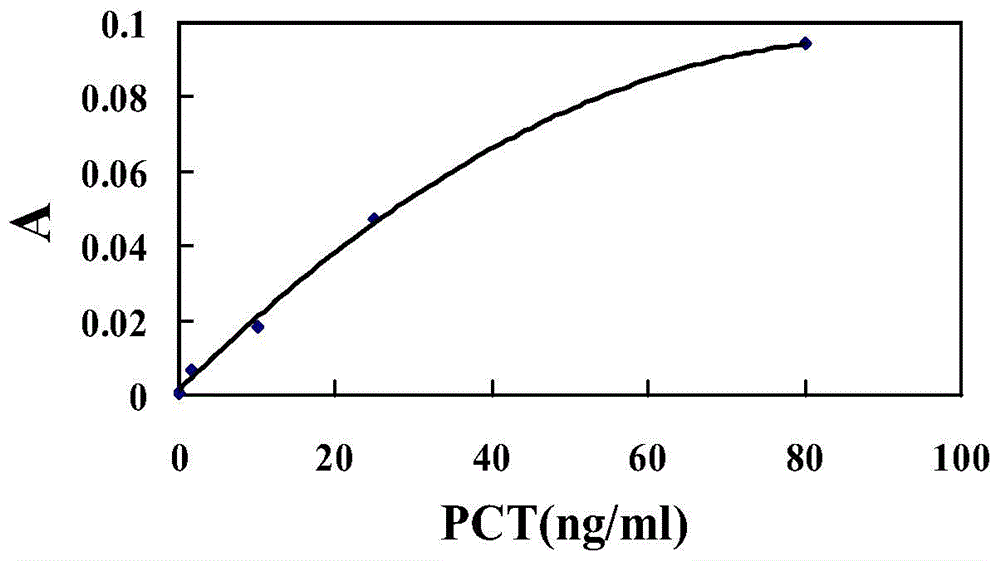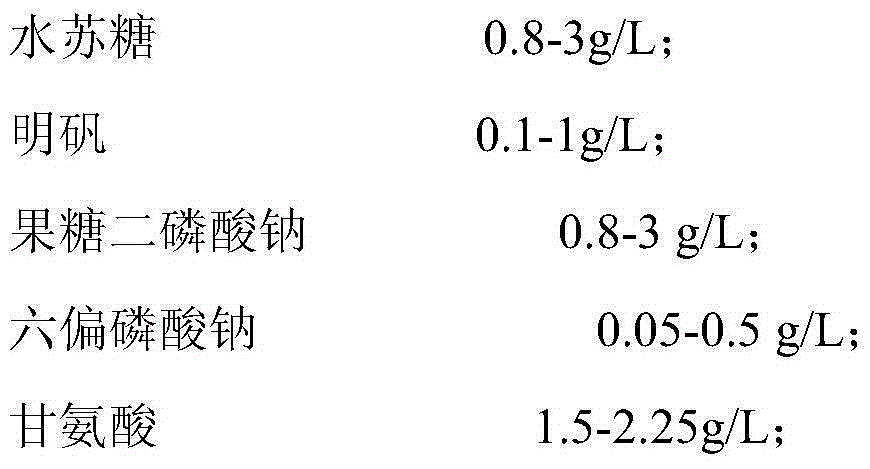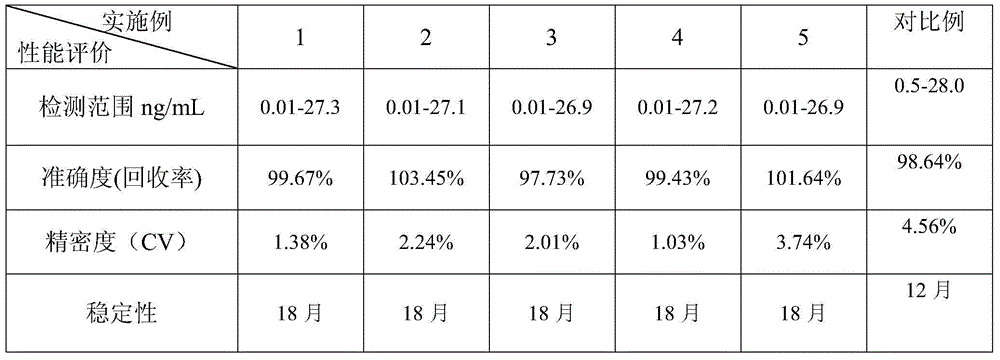D dimer latex-enhanced immunoturbidimetric assay kit utilizing surface functional group
A surface functional group and detection kit technology, applied in the field of D-dimer latex-enhanced immune turbidimetric detection kits, can solve problems such as time-consuming, and achieve the effects of increasing sensitivity, simplifying operation methods, and ensuring cross-linking effect.
- Summary
- Abstract
- Description
- Claims
- Application Information
AI Technical Summary
Problems solved by technology
Method used
Image
Examples
Embodiment 1
[0039] A D dimer latex enhanced immune turbidimetric detection kit, comprising the following preparation steps:
[0040] (1) Preparation of reagent R1:
[0041] Weigh 1.9g stachyose, 0.5g alum, 1.9g sodium fructose diphosphate, 0.3g sodium hexametaphosphate, 1.8g glycine, 27g NaCl, 35g PEG8000, 0.5g sodium azide, 10g bovine serum albumin and 1.42g Dissolve EDTA in 0.8L of distilled water, adjust the pH to 7.4, and dissolve 1L to obtain reagent R1.
[0042] (2) Preparation of reagent R2:
[0043] The above-mentioned washed polystyrene latex microspheres were diluted to a mass concentration of 1% with PBS buffer solution having a pH of 7.4 and a concentration of 50 mmol / L. Add 0.01g of EDC to 1L of the above latex dilution, stir and react at room temperature for 60min, centrifuge after the reaction and wash with PBS buffer to remove unreacted EDC, then add D-dimer antibody, stir and react at 37°C for 4h , add the stop solution 4h to terminate the reaction, centrifuge and wash...
Embodiment 2
[0045] A D dimer latex enhanced immune turbidimetric detection kit, comprising the following preparation steps:
[0046] (1) Preparation of reagent R1:
[0047] Weigh 1.9g stachyose, 0.5g alum, 1.9g sodium fructose diphosphate, 0.3g sodium hexametaphosphate, 1.8g glycine, 30g NaCl, 50g PEG8000, 0.5g sodium azide, 50g bovine serum albumin and 7.1g Dissolve EDTA in 0.8L of distilled water, adjust the pH to 7.4, and dissolve 1L to obtain reagent R1.
[0048] (2) Preparation of reagent R2:
[0049] Dilute the polystyrene latex microspheres to a mass concentration of 3% with MES buffer solution with a pH of 6.5 and a concentration of 100 mmol / L. Add 0.01g of EDC to 1L of the above latex dilution, stir and react at room temperature for 30min, centrifuge after the reaction and wash with PBS buffer to remove unreacted EDC, then add D-dimer antibody, stir and react at room temperature for 8h, Add stop solution for 4 hours to terminate the reaction, centrifuge and wash the obtained r...
Embodiment 3
[0051] A D dimer latex enhanced immune turbidimetric detection kit, comprising the following preparation steps:
[0052] (1) Preparation of reagent R1:
[0053] Weigh 1.9g stachyose, 0.5g alum, 1.9g sodium fructose diphosphate, 0.3g sodium hexametaphosphate, 1.8g glycine, 15g NaCl, 24g PEG8000, 0.5g sodium azide, 10g bovine serum albumin and 7.1g Dissolve EDTA in 0.8L of distilled water, adjust the pH to 7.4, and dissolve 1L to obtain reagent R1.
[0054] (2) Preparation of reagent R2:
[0055] Dilute the polystyrene latex microspheres to a mass concentration of 2% with MES buffer at a pH of 6.0 and a concentration of 100 mmol / L. Add 0.02g of EDC to 1L of the above latex dilution, stir and react at room temperature for 30min, centrifuge after the reaction and wash with PBS buffer to remove unreacted EDC, then add D-dimer antibody, stir and react at room temperature for 8h, Add stop solution for 4 hours to terminate the reaction, centrifuge and wash the obtained reaction sol...
PUM
| Property | Measurement | Unit |
|---|---|---|
| Particle size | aaaaa | aaaaa |
| Concentration | aaaaa | aaaaa |
Abstract
Description
Claims
Application Information
 Login to View More
Login to View More - R&D
- Intellectual Property
- Life Sciences
- Materials
- Tech Scout
- Unparalleled Data Quality
- Higher Quality Content
- 60% Fewer Hallucinations
Browse by: Latest US Patents, China's latest patents, Technical Efficacy Thesaurus, Application Domain, Technology Topic, Popular Technical Reports.
© 2025 PatSnap. All rights reserved.Legal|Privacy policy|Modern Slavery Act Transparency Statement|Sitemap|About US| Contact US: help@patsnap.com



